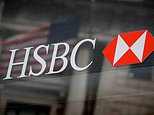British bank customers are at higher risk of being targeted by fraudsters, figures from HSBC show
Britons ‘are most at risk of bank fraud’: More than 80 per cent of crooked losses suffered by HSBC customers are in the UK, new figures show
HSBC data shows over 80 per cent of fraud losses are suffered by UK customersThis is despite the fact just 20 per cent of the lender’s business is based in BritainDavid Lindberg, chief executive of retail banking at NatWest, described the UK as a ‘fraudsters’ paradise’
<!–
<!–
<!–<!–
<!–
(function (src, d, tag){
var s = d.createElement(tag), prev = d.getElementsByTagName(tag)[0];
s.src = src;
prev.parentNode.insertBefore(s, prev);
}(“https://www.dailymail.co.uk/static/gunther/1.17.0/async_bundle–.js”, document, “script”));
<!–
DM.loadCSS(“https://www.dailymail.co.uk/static/gunther/gunther-2159/video_bundle–.css”);
<!–
British bank customers are at higher risk of being targeted by fraudsters than people elsewhere in the world, figures from HSBC show.
More than 80 per cent of fraud losses suffered by personal customers at the international lender are in the UK, even though less than 20 per cent of its business is in this country.
The revelation came after David Lindberg, chief executive of retail banking at NatWest, described the UK as a fraudsters’ paradise.
Figures from HSBC show more than 80 per cent of fraud losses are suffered by customers in the UK
Lenders including HSBC are also blaming internet giants such as Google, Facebook and Microsoft for hosting swathes of scam adverts on their sites, which lure in unsuspecting customers.
Stuart Haire, head of wealth and personal banking at HSBC UK, said the bank employs more than 10,000 anti-fraud staff across the world to keep customers safe.
Data from City watchdog the Financial Conduct Authority (FCA) last week showed banks and other regulated firms were employing 17,403 staff in the UK alone to prevent financial crime, costing them £1.1billion every year.
In the first half of this year criminals stole £754million – up 30 per cent on the same time last year.
During the entirety of the pandemic, they have tricked Britons out of more than £2billion.
At the weekend Money Mail launched its Outsmart the Scammers series, which continues today, to help savers protect their money.
This paper has also called on the Government to include financial scams in its upcoming Online Safety Bill, putting a duty on internet giants to take reasonable steps to ensure the legitimacy of adverts and content they host.
But so far the Government has refused, despite resounding support from MPs, the financial services industry, consumer rights campaigners and regulators.
Writing in the Mail last month, Tory MP Mel Stride, chairman of the Commons treasury committee, said he was ‘calling on the Government to legislate against fraudulent advertisements in its Online Safety Bill’.
Mr Haire also backed the move and said a ‘cross-industry approach’ is key to fraud prevention.
He added: ‘It is crucial that all those who bring risk into the system, including internet service providers and telecommunications companies, play their part in improving controls and prevention.’
Over the summer, Google voluntarily started to vet adverts on its website, ensuring the companies behind them were FCAregulated.
But other websites are still awash with scams. In one quick search, accountant and anti-fraud campaigner Mark Taber spotted four scam sites on Microsoft search engine Bing.
All of them had been on the FCA’s warning list for at least a month. The Department for Digital, Culture, Media and Sport said it will consider whether tougher regulation on online advertising is needed in a consultation later this year
![]()


